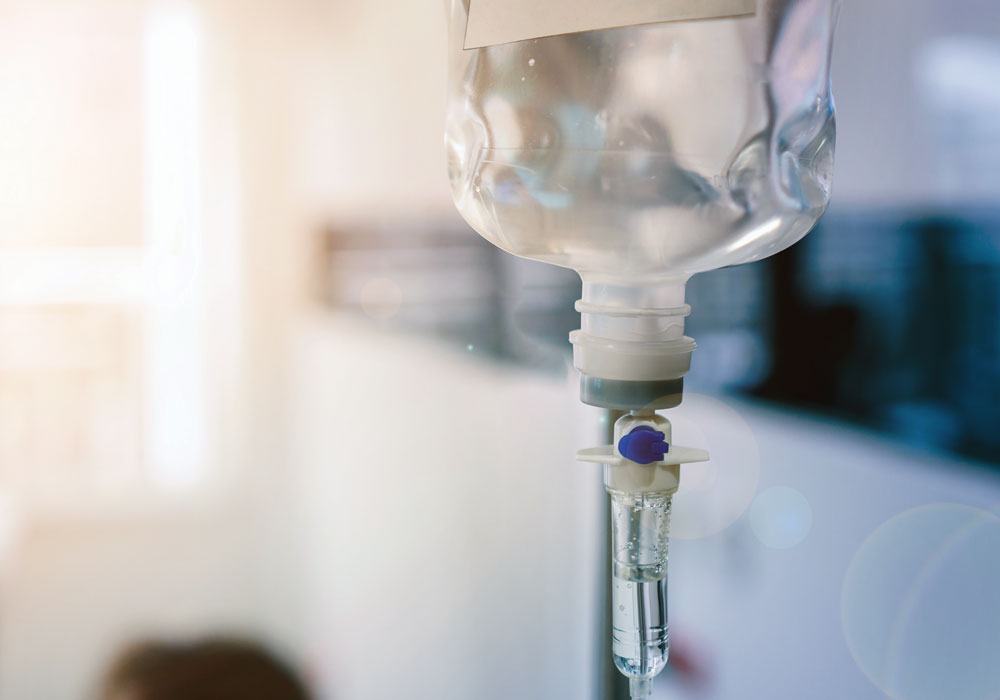After clinical trials demonstrated a 40% overall response rate with 63% of responses lasting six months or more, on May 21, 2021, the U.S. Food and Drug Administration (FDA) approved amivantamab-vmjw (RybrevantTM) for adult patients with locally advanced or metastatic non-small cell lung cancer (NSCLC) with epidermal growth factor receptor (EGFR) exon 20 insertion variants, as detected by an FDA-approved test, whose disease has progressed on or after platinum-based chemotherapy.
Category/Class
A low-fucose, fully human, immunoglobulin G1–based, biospecific antibody directed against the EGF and MET receptors
Mechanism of Action
In in vitro and in vivo studies, amivantamab-vmjw disrupted EGFR and MET signaling functions by blocking ligand binding and degradation of EGFR and MET in exon 20 insertion variant models.
Indication
Adult patients with locally advanced or metastatic NSCLC with EGFR exon 20 insertion variants, as detected by an FDA-approved test, whose disease has progressed on or after platinum-based chemotherapy
Dosing
The dose is based on baseline body weight. Patients weighing less than 80 kg receive 1,050 mg; those weighing 80 kg or more receive 1,400 mg.
Administration
Give via IV infusion weekly for four weeks, with the initial dose as a split infusion in week 1 on days 1 and 2, then administer every two weeks starting on week 5. Administration infusion rates begin at 50 ml per hour on week 1, day 1, and are titrated weekly up to a maximum of 125 ml per hour. Premedicate with an H1-receptor antagonist and antipyretic 15–30 minutes (IV) or 30–60 minutes (oral) prior to all infusions. A glucocorticoid is required for week 1, days 1 and 2, doses only and as necessary for subsequent infusions, given via IV 45–60 minutes prior to infusion.
Adverse Reactions
The most common adverse reactions (> 20%) are rash, infusion-related reactions, paronychia, musculoskeletal pain, dyspnea, nausea, fatigue, edema, stomatitis, cough, constipation, and vomiting. Severe (grade 3–4) laboratory abnormalities (> 2%) were decreased lymphocytes, decreased albumin, decreased phosphate, decreased potassium, increased glucose, increased alkaline phosphatase, increased gamma-glutamyl transferase, and decreased sodium.
The package insert carries the following warnings and precautions: infusion-related reactions (e.g., dyspnea, flushing, fever, chills, nausea, chest discomfort, hypotension, vomiting), interstitial lung disease or pneumonitis, dermatologic adverse reactions, ocular toxicity, and embryo-fetal toxicity.
Nursing Considerations
Monitor for infusion-related reactions. Interrupt infusion at the first sign of reaction. Reduce infusion rate or permanently discontinue based on severity. Give via a peripheral line for week 1 and 2 infusions because of a high incidence (65% on week 1, day 1, infusions) of infusion-related reactions. Administer using an infusion set fitted with a flow regulator that has an inline, sterile, nonpyrogenic, low protein–binding polyethersulfone filter. Verify pregnancy status prior to starting treatment. Refer to the package insert for infusion rates for both dose.
Patient Education
Alert your healthcare provider immediately for any signs or symptoms of infusion-related reactions and to report new or worsening respiratory symptoms, eye symptoms, signs of paronychia, or dermatologic adverse reactions. Limit direct sun exposure, use broad-spectrum UVA/UVB sunscreen, wear protective clothing during treatment, and apply alcohol-free emollient cream to dry skin during and for two months following treatment. Patients of reproductive potential must use effective contraception during treatment and for three months after the final dose. Avoid breastfeeding during treatment and for three months after the final dose.
Gero-Oncology Considerations
No clinically important differences in safety or efficacy were observed between patients aged 65 years or older and younger patients.
Safe Handling
Ambivantamab-vmjw is considered a hazardous drug because of its reproductive risk and can cause embryo-fetal toxicity.
Patient Assistance Program
Janssen CarePath is available online or 833-RYBREVANT (833-792-7382).






